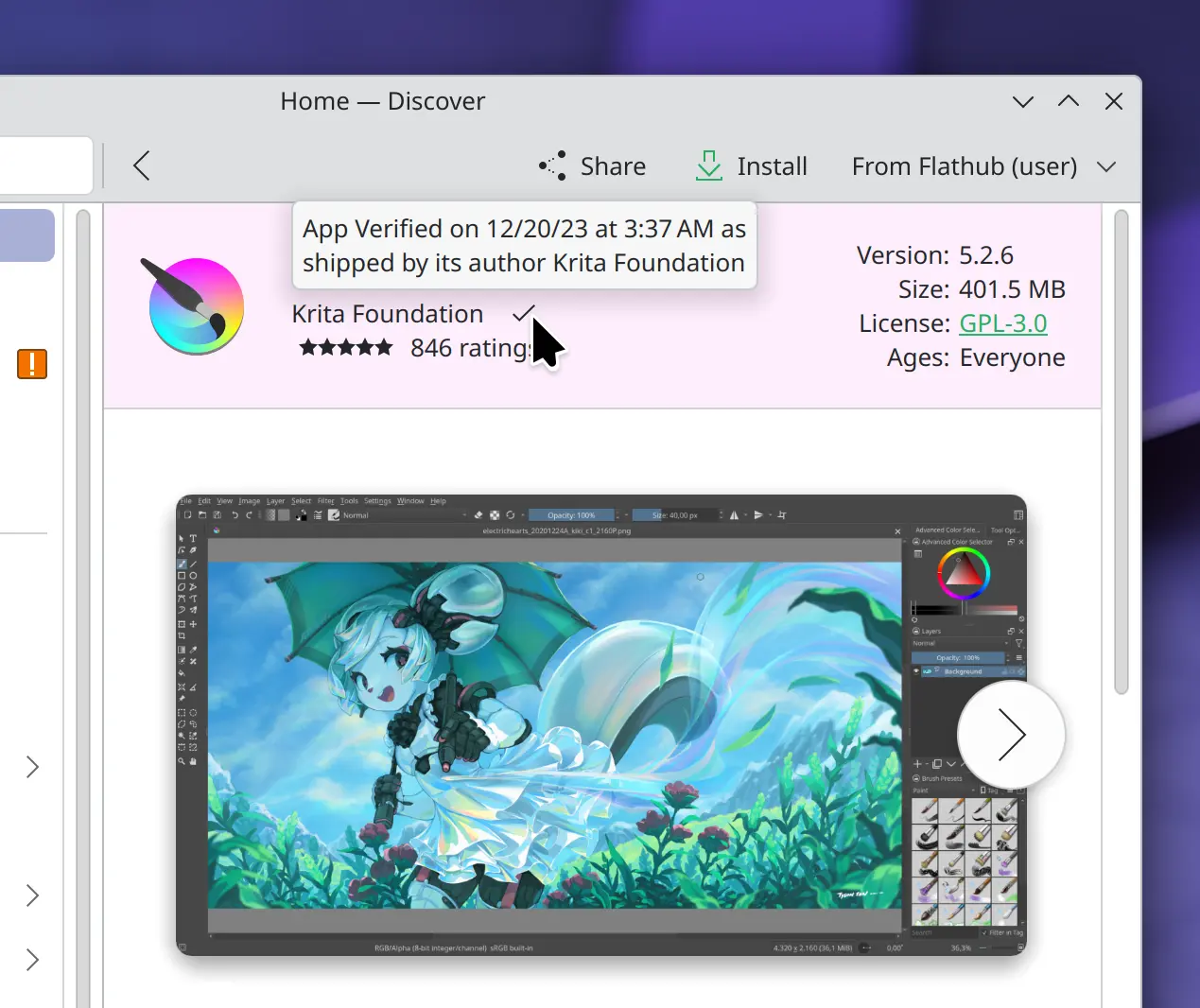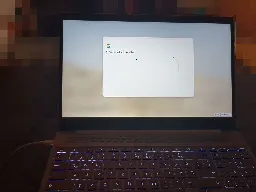
 boredsquirrel @slrpnk.net
boredsquirrel @slrpnk.net My Keyoxide Idendity:
aspe:keyoxide.org:TJXAWXPMSAG6VPARJQRWNB2TPA
Hm ich würde einfach mal nach Herstellern schauen, vllt mal kontaktieren. Und Schuhe kann man ja entweder vor Ort oder auch mit Versand kostenlos probieren
Freundchen hier wird nicht gespaßt! Ändern oder es folgen Konsequenzen!

Hab letztens auf der Autarkia Messe erst einen Barfußschuhhersteller gesehen
Ich glaub der war von Sole-Runner
Ansonsten gibt es suuper viele neue Hersteller in der EU.
Es sei denn du hast wirklich crazy Füße.
Mööp deine Titel sind alle nicht konform, ansonsten kühler Tipp!
Google Pixel mit GrapheneOS. Besser geht es nicht.
Hat alle Minimalismus-Ansprüche die du willst. Im "private space" oder im arbeitsprofil, oder einfach direkt kannst du auch den Playstore installieren, der aber in einer normalen Sandbox läuft und damit wenig invasiv ist.
Die neuen haben 8 Jahre Softwareupdates und mit GrapheneOS oder DivestOS kann man sie auch noch länger benutzen.
Ich würde dir ein 8a empfehlen.
If you want to host stuff, you probably want Termux. It is its own distribution but you may want to run a Debian proot inside Termux, which will have way more software and maybe also more reliably and fast security updates (heard that was a problem in Termux)
Dankesehr
Okay that is probably true. Pretty crazy actually. Also cool to have good sounding earphones too.
They could just have used anything else... or is there no alternative?
Bissl spät dafür
KKR hat bereits genug in erneuerbare investiert, jetzt machen sie Werbung für Energiewende
The images are all next to text, add a linebreak, they are messed up on Jerboa ;)
What would you expect?
The tor network has more common stuff, drugs etc.
I2p meanwhile is just really good for anonymity. I think using it for messengers is the best use. I was able to find a bunch of stuff, and yes unlike the dark web this would mostly be also there on the clearnet, mainly because there is no such business on i2p I guess
Just random people offering services for free, a few pads, pastebins, fileservers
You can find quite some cool stuff actually, but I think the main advantage is using it for messaging
And unlike i2p, i2pd also doesnt really use much battery? I could totally keep that on all day
I didnt understand your message
Anyone can host a site. Just keep it up for like a month without a pause so that it can be discovered.
Then go to a domain registrar and get a domain name. I2p sites have BASE32 names, kinda like onion addresses. But they can also use shorter names like postman.i2p
If you register such a name, the site will become more discoverable as those registrars likely share the sites, you might appear in some lists, people connect to you, add you to their address book and forward stuff to you.
Using i2p on Android with Mull
Attached: 4 images How to use #i2p on #GrapheneOS, using #mull (#firefox) Only Firefox seems to be able to use a regular ol' HTTP proxy, on Android. Pretty crazy. 1. Install i2p, on Android you can use: - [I2P](https://github.com/i2p/i2p.android.base) - I2PD, [this F-Droid repo](https://fdroid.i2...

On Android/GrapheneOS, Firefox/Mull/variants is the only browser with the needed proxy settings to use with i2p.
After a bit of searching, it works very well!
As i2p servers you can use "i2p", "i2pd" (more minimal but more efficient) or "InviziblePro" which bundles some implementation of i2p.
I am using i2pd currently, and it works well.
Installed the apps with Obtainium
- Mull from the DivestOS F-Droid repo
- i2pd from the purplei2p F-Droid repo
- MullvadVPN from Github, Orbot from the guardianproject repo (as fallback if clearnet sites are used)
The browser can open .i2p and clearnet sites, using a little hack:
network.proxy.no_proxies_on to !.i2p
Use i2p on Android with Mull/Firefox
On Android/GrapheneOS, Firefox/Mull/variants is the only browser with the needed proxy settings to use with i2p.
After a bit of searching, it works very well!
As i2p servers you can use "i2p", "i2pd" (more minimal but more efficient) or "InviziblePro" which bundles some implementation of i2p.
I am using i2pd currently, and it works well.
Installed the apps with Obtainium
- Mull from the DivestOS F-Droid repo
- i2pd from the purplei2p F-Droid repo
- MullvadVPN from Github, Orbot from the guardianproject repo (as fallback if clearnet sites are used)
The browser can open .i2p and clearnet sites, using a little hack:
network.proxy.no_proxies_on to !.i2p
Using i2p on Android with Mull and i2pd
Attached: 4 images How to use #i2p on #GrapheneOS, using #mull (#firefox) Only Firefox seems to be able to use a regular ol' HTTP proxy, on Android. Pretty crazy. 1. Install i2p, on Android you can use: - [I2P](https://github.com/i2p/i2p.android.base) - I2PD, [this F-Droid repo](https://fdroid.i2...

On Android/GrapheneOS, Firefox/Mull/variants is the only browser with the needed proxy settings to use with i2p.
After a bit of searching, it works very well!
As i2p servers you can use "i2p", "i2pd" (more minimal but more efficient) or "InviziblePro" which bundles some implementation of i2p.
I am using i2pd currently, and it works well.
Installed the apps with Obtainium
- Mull from the DivestOS F-Droid repo
- i2pd from the purplei2p F-Droid repo
- MullvadVPN from Github, Orbot from the guardianproject repo (as fallback if clearnet sites are used)
The browser can open .i2p and clearnet sites, using a little hack:
network.proxy.no_proxies_on to !.i2p
Oooh crazy!
You didnt layer aurora on bazzite, you rebased.
This is very problematic and I didnt know this could happen. OCI images dont have a concept of "removing packages". Instead, they are always removed on the local system.
The firefox issue is uBlue people being weird. They remove it, preventing anyone from installing it. Instead you need to use the firefox tar archive from their website, works well too but is kinda random as you need to place it in some nonstandard folder.
Steam is interesting. Please report that. I am not sure how these things work but my theory is that the installer (anaconda) wrote the system to your PC with the default configuration (with steam).
Then you rebased to Aurora but the system was still originally Bazzite. Which is odd, ai thought there was no such state. Please report that to them!
My idea is to rebase to their main image and then back to aurora. This may remove this steam error. The main images also still have firefox and just the codecs etc added, so I can recommend them.
UBlue removed the instructions on how to do that from their website with the redesign.
Use the rebase command you used, but use ublue-os/kinoite-main:latest instead of ublue-os/aurora:latest in the rebase command.
Then rebase back to aurora after a reboot. But tbh I didnt like Aurora it is weird and kinda random. I like ujust and yafti though. I am on Fedora Kinoite with a huge set of layers. Works very fine too, still worlds faster than Windows updates LOL
Well SteamOS doesnt use the Steam Flatpak. Otherwise that would be kinda fun.
They also do their own versioning of Arch packages
KDE Discover now shows verification status of Flatpak apps!


This is great. Having access to all apps is nice, but it is also useful to know how and if flatpak apps are verified.
This mostly means they are packaged by official developers. This guarantees better security, as the chain of trust is shorter, and better support.
No, not for browsers.
Chromium Browsers may be secure, but afaik there was no security audit of Chromium Flatpaks. Their sandbox is highly modified, so one would really make sense.
No another one
Well often the answer is just to layer stuff. It is not true that containers fix everything, and rpm-ostree is a tool that manages RPMs.
rpm-ostree install steam \
libvirt-daemon-driver-network \
libvirt-daemon-driver-nodedev \
libvirt-daemon-driver-qemu \
libvirt-daemon-driver-storage-core \
qemu-audio-spice \
qemu-char-spice \
qemu-device-display-qxl \
qemu-device-display-virtio-gpu \
qemu-device-display-virtio-vga \
qemu-device-usb-redirect \
qemu-system-x86-core
After reboot
systemctl --now enable virtnetworkd.service
systemctl --now enable virtqemud.service
Script to install Brave and Vivaldi variants on Fedora Atomic
A simple interactive script to install Brave (stable, beta, nightly) or Vivaldi on Fedora Atomic - boredsquirrel/browserscript-fedora-atomic

Easily install your favourite browsers on Fedora Atomic Desktops, Silverblue, Kinoite, uBlue, Bazzite, Aurora, Bluefin, Secureblue etc.
Getting a Nitrokey 3A work with usbguard
Using usbguard is pretty essential to protect against common attacks like malicious devices, rubber duckies, OMG cables or the “governmental 3 letter agency equivalents”. Especially thunderbolt (which can be blocked globally, see this config as to how can grant attackers access to your RAM, which m...

Getting a Nitrokey 3A work with usbguard on Fedora
Using usbguard is pretty essential to protect against common attacks like malicious devices, rubber duckies, OMG cables or the “governmental 3 letter agency equivalents”. Especially thunderbolt (which can be blocked globally, see this config as to how can grant attackers access to your RAM, which m...

Interview with Mark Shuttleworth, creator of Ubuntu

YouTube Video
Click to view this content.
The interview is in english
TIL
- Mark was a Debian contributor
- His goal was to make Linux succeed like Dropbox and Netflix
- He acknowledges how ChromeOS and Android (both newer than Ubuntu afaik) shaped the Linux Desktop
- ChromeOS uses upstart, the init system that Canonical created
- Canonical is smaller than SUSE
- Mark considers Ubuntu to be more open than Fedora because they have
flatpakin their repos (well, Snaps arent sandboxed outside of Apparmor, so that just makes sense I guess?) - Ubuntu kept in contact with GNOME while switching to Unity, so they could easily fall back
- Microsofted lured in Linux devs with money, to make licensed software
- The cloud department in Microsoft was pretty progressive, using Linux anyways
- Azurelinux is a competitor against Ubuntu
wayland-transpositor: display remote or virtualized windows on the host using Wayland - written in Rust
Contribute to wayland-transpositor/wprs development by creating an account on GitHub.

Contribute network location data to get location everywhere without sattelites!
Wie geht einfache schnelle Standortbestimmung überall,, auch in Gebäuden und ohne Satteliten? Hier hilft #NLP (network location position), also Standortbestimmung ohne #GPS oder #AGPS Mithilfe von Datenbanken kann dein Handy dir so sagen, wo du bist, aufgrund von umliegenden Mobilfunktürmen, WLan...
Opensource geodata of celltowers, wifis and bluetooth beacons is crucial.
It allows apps like UnifiedNLP to give the OS the location data it needs, without relying on GPS Sattelites.
GPS can be tampered with, and A-GPS is not privacy friendly at all.
UnifiedNLP is only found included in microG, which is pretty insecure.
But GrapheneOS devs are working on a regular user app that serves network location data, using Apple, Apple (proxied) or a local BeaconDB database!
BeaconDB is a new service to replace MozillaLocationServices which has shut down unfortunately.
Apps like TowerCollector dont yet support it, but NeoStumbler does, and also has more advanced features.
Collect network info in your region, and in the future you (and everyone else using it) dont need GPS anymore!
(You can also use the screenshots in that mastodon thread as reference)
Contribute network location data to get location everywhere without sattelites!
Wie geht einfache schnelle Standortbestimmung überall,, auch in Gebäuden und ohne Satteliten? Hier hilft #NLP (network location position), also Standortbestimmung ohne #GPS oder #AGPS Mithilfe von Datenbanken kann dein Handy dir so sagen, wo du bist, aufgrund von umliegenden Mobilfunktürmen, WLan...
Opensource geodata of celltowers, wifis and bluetooth beacons is crucial.
It allows apps like UnifiedNLP to give the OS the location data it needs, without relying on GPS Sattelites.
GPS can be tampered with, and A-GPS is not privacy friendly at all.
UnifiedNLP is only found included in microG, which is pretty insecure.
But GrapheneOS devs are working on a regular user app that serves network location data, using Apple, Apple (proxied) or a local BeaconDB database!
BeaconDB is a new service to replace MozillaLocationServices which has shut down unfortunately.
Apps like TowerCollector dont yet support it, but NeoStumbler does, and also has more advanced features.
Collect network info in your region, and in the future you (and everyone else using it) dont need GPS anymore!
(You can also use the screenshots in that mastodon thread as reference)
Contribute network location data to get location everywhere without sattelites!
Wie geht einfache schnelle Standortbestimmung überall,, auch in Gebäuden und ohne Satteliten? Hier hilft #NLP (network location position), also Standortbestimmung ohne #GPS oder #AGPS Mithilfe von Datenbanken kann dein Handy dir so sagen, wo du bist, aufgrund von umliegenden Mobilfunktürmen, WLan...
Opensource geodata of celltowers, wifis and bluetooth beacons is crucial.
It allows apps like UnifiedNLP to give the OS the location data it needs, without relying on GPS Sattelites.
GPS can be tampered with, and A-GPS is not privacy friendly at all.
UnifiedNLP is only found included in microG, which is pretty insecure.
But GrapheneOS devs are working on a regular user app that serves network location data, using Apple, Apple (proxied) or a local BeaconDB database!
BeaconDB is a new service to replace MozillaLocationServices which has shut down unfortunately.
Apps like TowerCollector dont yet support it, but NeoStumbler does, and also has more advanced features.
Collect network info in your region, and in the future you (and everyone else using it) dont need GPS anymore!
(You can also use the screenshots in that mastodon thread as reference)
Contribute network location data to get location everywhere without sattelites!
Wie geht einfache schnelle Standortbestimmung überall,, auch in Gebäuden und ohne Satteliten? Hier hilft #NLP (network location position), also Standortbestimmung ohne #GPS oder #AGPS Mithilfe von Datenbanken kann dein Handy dir so sagen, wo du bist, aufgrund von umliegenden Mobilfunktürmen, WLan...
Opensource geodata of celltowers, wifis and bluetooth beacons is crucial.
It allows apps like UnifiedNLP to give the OS the location data it needs, without relying on GPS Sattelites.
GPS can be tampered with, and A-GPS is not privacy friendly at all.
UnifiedNLP is only found included in microG, which is pretty insecure.
But GrapheneOS devs are working on a regular user app that serves network location data, using Apple, Apple (proxied) or a local BeaconDB database!
BeaconDB is a new service to replace MozillaLocationServices which has shut down unfortunately.
Apps like TowerCollector dont yet support it, but NeoStumbler does, and also has more advanced features.
Collect network info in your region, and in the future you (and everyone else using it) dont need GPS anymore!
(You can also use the screenshots in that mastodon thread as reference)
Coreboot install on an 8th Gen HP Chromebook
I got a HP Chromebook used, bought it to flash it and convert it into a nice secure Linux machine. The CPU is quite old and actively cooled, but the display is huge! Will become a nice workstation once a real OS is on there (go away Gemini). 1. Logging in normally I started it up normally. Logg...

The CPU is quite old and the ports are horrendous.
But that machine has a crazy screen, pretty nice keyboard (actually my first laptop with a numpad ever) and the fan is really silent.
And the install was very easy. Now runs Fedora Kinoite!
Chromebooks, with Linux, not just ChromeOS (the batterylife difference is tiny) are really great for simple office stuff and even media consumption, while being efficient.
My main, 11in Lenovo Chromebook just lost 30% batterylife over a course of 4 hours or more. And it costed 140€!
Boo! Making Your Ubuntu Linux Desktop Halloween Ready

YouTube Video
Click to view this content.
MullvadVPN Tricks: Making MullvadVPN work better on GNU/Linux
Making MullvadVPN work better on GNU/Linux. Contribute to boredsquirrel/MullvadVPN-Tricks development by creating an account on GitHub.

Just made a dedicated repo about a bunch of tricks I regularly use.
A KDE Plasmoid is definetly missing on that list. Having it work without garbage Electron, at least most of the time, is crucial.
DE: Jährliche Anhörung der Geheimdienstchef*innen
Das Parlamentarische Kontrollgremium befragt die Chef:innen der Geheimdienste

Edith: ist anscheinend die vom letzten Jahr
Israel, Russland und mehr.
Die Geheimdienste wissen sehr viel mehr als wir, so bekommen wir wenigstens ein bisschen.
Ich teile nur den Link. Dass gleich am Anfang Israel verteidigt wird, ist absolut blind.


